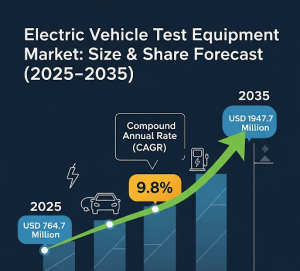Electric Vehicle Test Equipment Market Surges to USD 1947.7 million by 2035, Propelled by a 9.8% CAGR
Market Growth Fueled by Safety, Performance Validation, and New Business Models, Offering Strategic Opportunities for Manufacturers.
NEWARK, DE, UNITED STATES, August 8, 2025 /EINPresswire.com/ -- A new industry analysis reveals a transformative growth trajectory for the Electric Vehicle Test Equipment Market, projecting its value to skyrocket from an estimated USD 764.7 million in 2025 to USD 1947.7 million by 2035. This remarkable expansion, driven by a robust compound annual growth rate (CAGR) of 9.8%, signals a profound opportunity for manufacturers to innovate and position themselves as essential partners in the global transition to electrified transportation.
The rapid market expansion is not merely a reflection of increasing EV production; it is a direct response to the escalating complexities and stringent demands placed on vehicle safety, performance, and compliance. As automakers and their supply chains grapple with the need to validate new battery chemistries, high-voltage powertrains, and integrated systems, the demand for sophisticated, efficient, and adaptable testing solutions has become a mission-critical imperative. For test equipment providers, this dynamic environment creates a compelling landscape to offer highly specialized diagnostic, simulation, and validation tools that shorten development cycles, ensure regulatory adherence, and mitigate risk.
The Dominance of Passenger Cars and BEVs Unlocks Key Opportunities
The analysis highlights that the passenger car segment is poised to maintain its leadership, commanding a substantial 61.5% share of the market. This dominance is a direct result of government incentives, consumer adoption, and OEM strategies that prioritize electrification. For test equipment manufacturers, this segment represents a fertile ground for innovation, requiring flexible and modular solutions capable of handling the diverse needs of modern passenger EV systems, from batteries and inverters to power electronics. The demand for customized solutions that can meet the rigorous performance and safety benchmarks for passenger cars is a consistent and growing driver.
Similarly, the Battery Electric Vehicles (BEVs) segment leads the fuel type category with a commanding 48.9% market share. As BEVs form the backbone of future mobility strategies, the need for specialized testing of battery management systems, thermal efficiency, and motor control is more critical than ever.
Addressing the Critical Need for Component and Sub-System Validation
Within the application category, EV component testing holds a significant 29.7% share, underscoring its pivotal role in ensuring overall vehicle functionality. This segment focuses on rigorous validation of power electronics, battery packs, electric drive units, and control systems—the very heart of an EV. For manufacturers, providing solutions in this area is a strategic move to address a key pain point for automakers: the need for reliable, component-level performance validation under a range of conditions. The shift toward modular vehicle architectures and software-defined systems is further increasing the importance of simulation-based testing and Hardware-in-the-Loop (HIL) methodologies, creating a significant runway for growth in this application segment.
Global Growth Hotspots: A Strategic Roadmap for Manufacturers
The market’s expansion is geographically diverse, with several key regions driving significant growth. China leads the trajectory with a remarkable 13.2% CAGR, fueled by its vertically integrated EV ecosystem and robust battery testing infrastructure. This presents a clear opportunity for test equipment providers to support local OEMs and component suppliers with high-throughput solutions for battery validation and powertrain efficiency. India follows with a 12.3% CAGR, driven by the unique needs of its two-wheeler, electric rickshaw, and light-duty EV segments. Test equipment manufacturers can find success by catering to the country's emerging component start-ups and government-supported test labs.
In Europe, Germany is projected to grow at an 11.3% CAGR, reflecting its strong focus on quality assurance for high-voltage systems. The UK shows a healthy 9.3% growth, with opportunities concentrated in third-party labs and commercial fleet retrofits. The United States, expanding at an 8.3% CAGR, presents opportunities in high-performance niches like aerospace and motorsport, as well as with new EV startups developing innovative prototypes. This regional breakdown provides a clear roadmap for manufacturers to align their strategies with specific market demands and growth drivers.
Strategic Innovation and Competitive Landscape
The competitive landscape is defined by key players such as National Instruments Corporation, Intertek Group Plc, Keysight Technologies, Inc., Tuv Rheinland, Durr Group, AVL, and Chroma ATE. These industry leaders are driving innovation and setting the pace for market development. A notable example is Keysight Technologies' expansion of its RP7900 series, which now supports EV testing at higher power levels. This bi-directional system, announced in late 2024, enhances efficiency for battery, EVSE, and drivetrain testing by returning unused power to the grid, a testament to the industry's focus on creating more efficient and sustainable testing solutions.
Manufacturers are increasingly leveraging new business models to meet market needs. Opportunities exist in offering modular test systems that can adapt to different voltage levels and battery chemistries. The rise of subscription-based platforms for remote diagnostics and calibration services offers a path for manufacturers to reduce capital exposure and scale with evolving EV standards. This shift toward service-oriented platforms and flexible access models creates a new growth path for providers looking to forge long-term partnerships with automakers and suppliers.
A Market Poised for Continued Growth
The Electric Vehicle Test Equipment Market is at a pivotal moment, with a strong foundation for continued growth. As the global transition to electric mobility accelerates, the demand for precise, efficient, and sophisticated testing solutions will only intensify. For manufacturers, the path to future growth lies in a deep understanding of these market drivers, a focus on providing tailored solutions, and a willingness to embrace new business models that support their partners in meeting the challenges of a rapidly evolving automotive landscape.
Request Automotive Valve Seat Insert Market Draft Report -
https://www.futuremarketinsights.com/reports/sample/rep-gb-22794
For more on their methodology and market coverage, visit
https://www.futuremarketinsights.com/about-us
Explore Related Insights
Electric Boat Market:
https://www.futuremarketinsights.com/reports/electric-boats-market
Electric Bike Market:
https://www.futuremarketinsights.com/reports/electric-bike-market
Electric Motorcycles And Scooters Market:
https://www.futuremarketinsights.com/reports/electric-motorcycles-and-scooters-market
Electric Kick Scooter Market:
https://www.futuremarketinsights.com/reports/electric-kick-scooter-market
Automotive Brake Shims Market:
https://www.futuremarketinsights.com/reports/automotive-brake-shims-market
Editor’s Note:
The Electric Vehicle Test Equipment Market is expanding, driven by rising EV production and stricter performance standards. Technological advancements and growing charging infrastructure are boosting demand, with strong growth in Asia-Pacific and Europe
Rahul Singh
Future Market Insights Inc.
+1 347-918-3531
email us here
Legal Disclaimer:
EIN Presswire provides this news content "as is" without warranty of any kind. We do not accept any responsibility or liability for the accuracy, content, images, videos, licenses, completeness, legality, or reliability of the information contained in this article. If you have any complaints or copyright issues related to this article, kindly contact the author above.
Despite Its Proven Benefits, Only Few Companies Track Internal eNPS, New Reports State
Out of Band Authentication Market to Hit USD 6.0 Billion by 2035 Amid Rising Cybersecurity and Compliance Challenges
A' International Smart Living and Home Automation Design Awards Call for Nominations
Więcej ważnych informacji
 Jedynka Newserii
Jedynka Newserii

 Jedynka Newserii
Jedynka Newserii

Handel

Mercosur to tylko wierzchołek góry lodowej. UE ma ponad 40 umów handlowych, które mogą destabilizować rynek rolny
Umowa handlowa między UE a krajami Mercosur może znacząco zaburzyć konkurencję na rynku rolnym i osłabić pozycję unijnych, w tym polskich, producentów – ostrzegają rolnicy i producenci żywności. Umowie sprzeciwia się część krajów unijnych, które domagają się klauzuli ochronnych oraz limitów importowych. – Problemem jest jednak nie tylko ta konkretna umowa. Chodzi o cały system wolnego handlu, który się kumuluje z dziesiątek innych porozumień – podkreśla Andrzej Gantner, wiceprezes Polskiej Federacji Producentów Żywności.
Firma
Dzięki zdalnej weryfikacji tożsamości z wykorzystaniem AI firmy zminimalizowały liczbę oszustw. Rozwiązania wykorzystuje głównie sektor finansowy

Z najnowszych danych Eurostatu wynika, że w 2024 roku 5,9 proc. polskich firm korzystało z rozwiązań z zakresu sztucznej inteligencji. W 2023 roku był to odsetek na poziomie 3,67 proc. Wciąż jednak jest to wynik poniżej średniej unijnej, która wyniosła 13,48 proc. Jednym z obszarów, który cieszy się coraz większym zainteresowaniem wśród przedsiębiorców, jest weryfikacja tożsamości przez AI, zwłaszcza w takich branżach jak bankowość, ubezpieczenia czy turystyka. Jej zastosowanie ma na celu głównie przeciwdziałać oszustwom i spełniać wymogi regulacyjne.
Prawo
Daniel Obajtek: Własne wydobycie i operacyjne magazyny to filary bezpieczeństwa. Zgoda na magazyny gazu poza krajem to rezygnacja z suwerenności energetycznej

Były prezes Orlenu ostrzega przed zmianami w ustawie o zapasach ropy naftowej, produktów naftowych i gazu ziemnego. Jego zdaniem przygotowana przez rząd nowelizacja tzw. ustawy magazynowej i ujednolicanie unijnej polityki energetycznej to zagrożenie dla bezpieczeństwa energetycznego Polski. W jego opinii tylko silna spółka narodowa, własne wydobycie, krajowe magazyny i zbilansowany miks energetyczny zapewnią Polsce bezpieczeństwo i konkurencyjność.
Partner serwisu
Szkolenia

Akademia Newserii
Akademia Newserii to projekt, w ramach którego najlepsi polscy dziennikarze biznesowi, giełdowi oraz lifestylowi, a także szkoleniowcy z wieloletnim doświadczeniem dzielą się swoją wiedzą nt. pracy z mediami.





![Nestlé w Polsce podsumowuje wpływ na krajową gospodarkę. Firma wygenerowała 0,6 proc. polskiego PKB [DEPESZA]](https://www.newseria.pl/files/1097841585/fabryka-nesquik_1,w_85,r_png,_small.png)



.gif)

 |
| |
| |
|